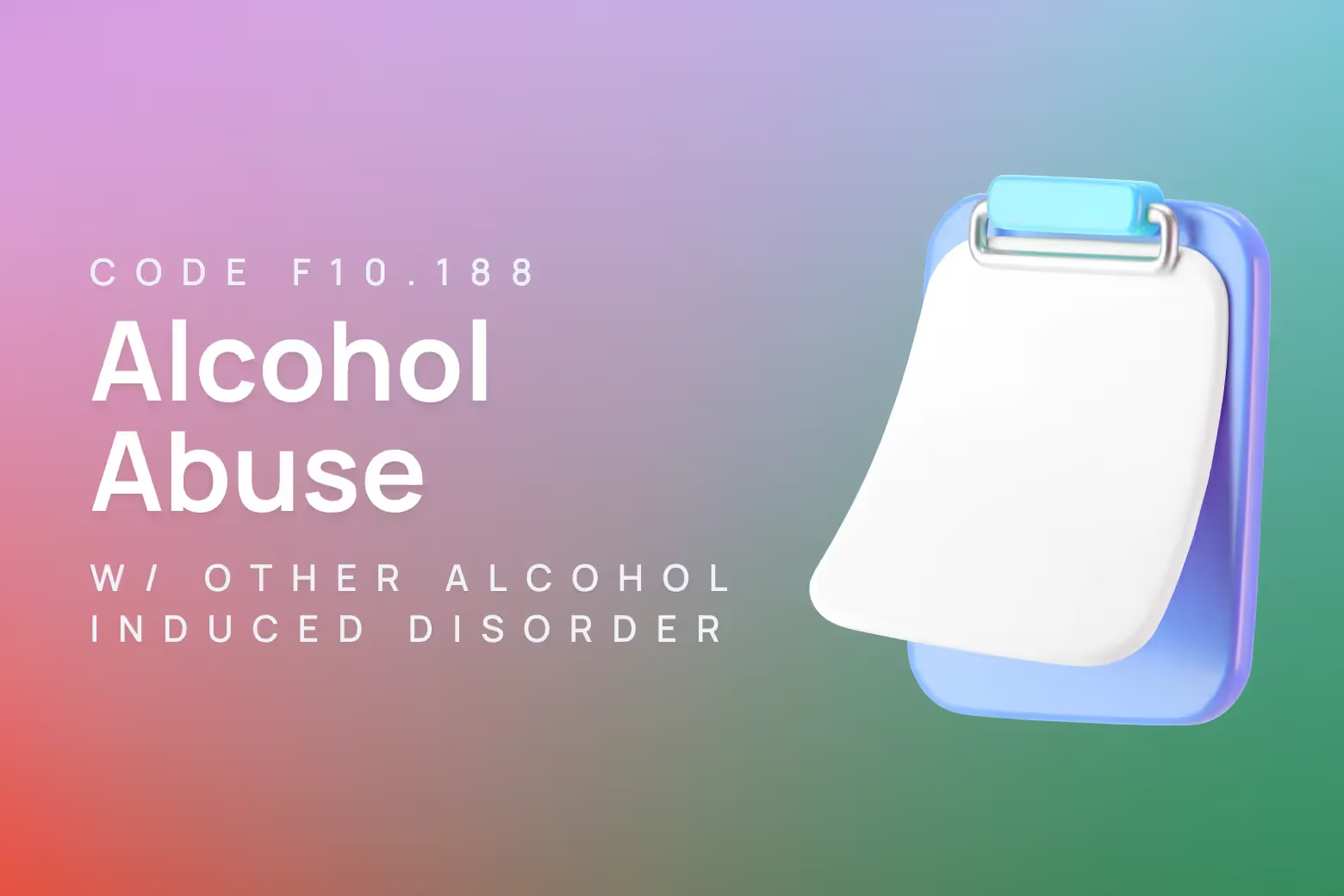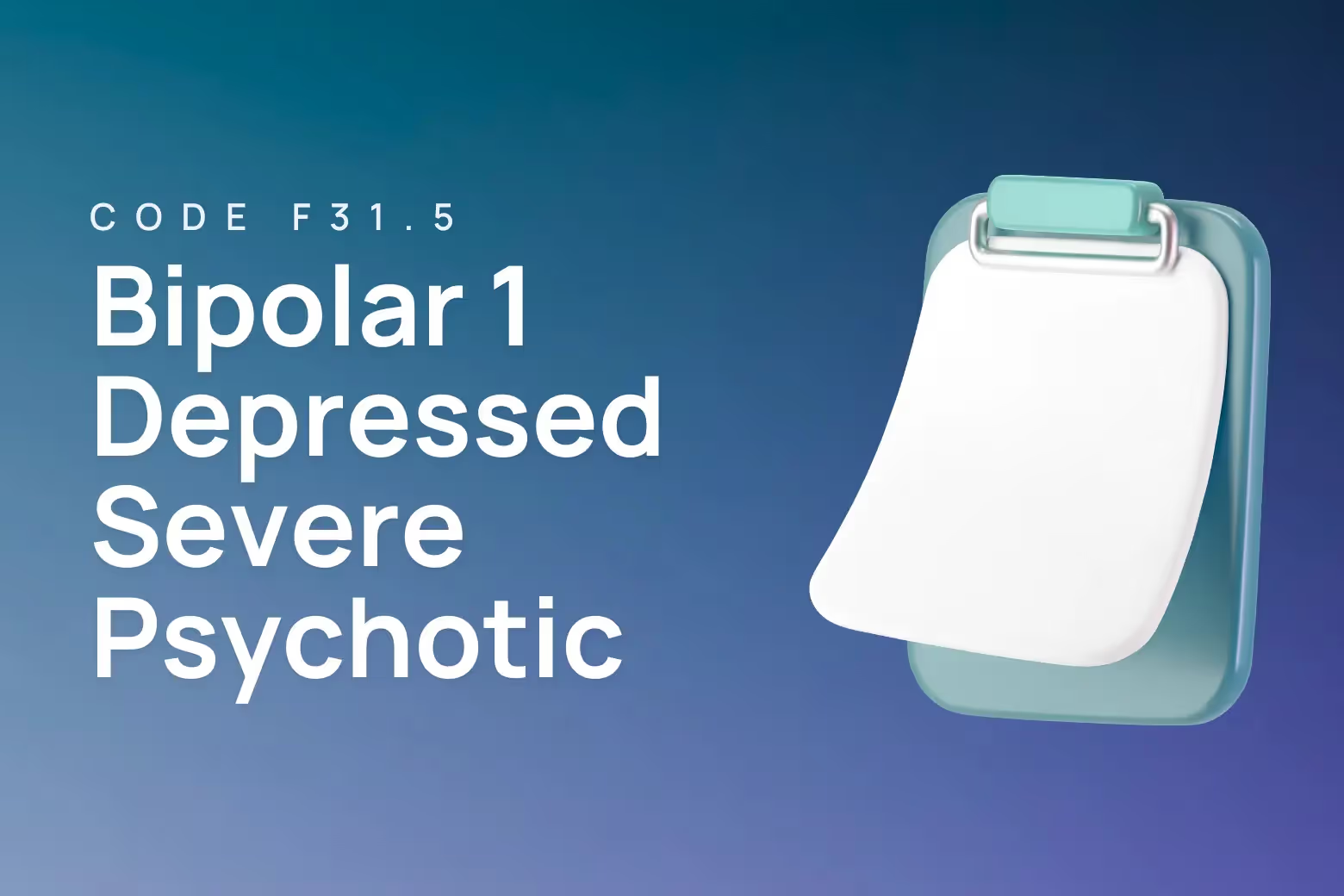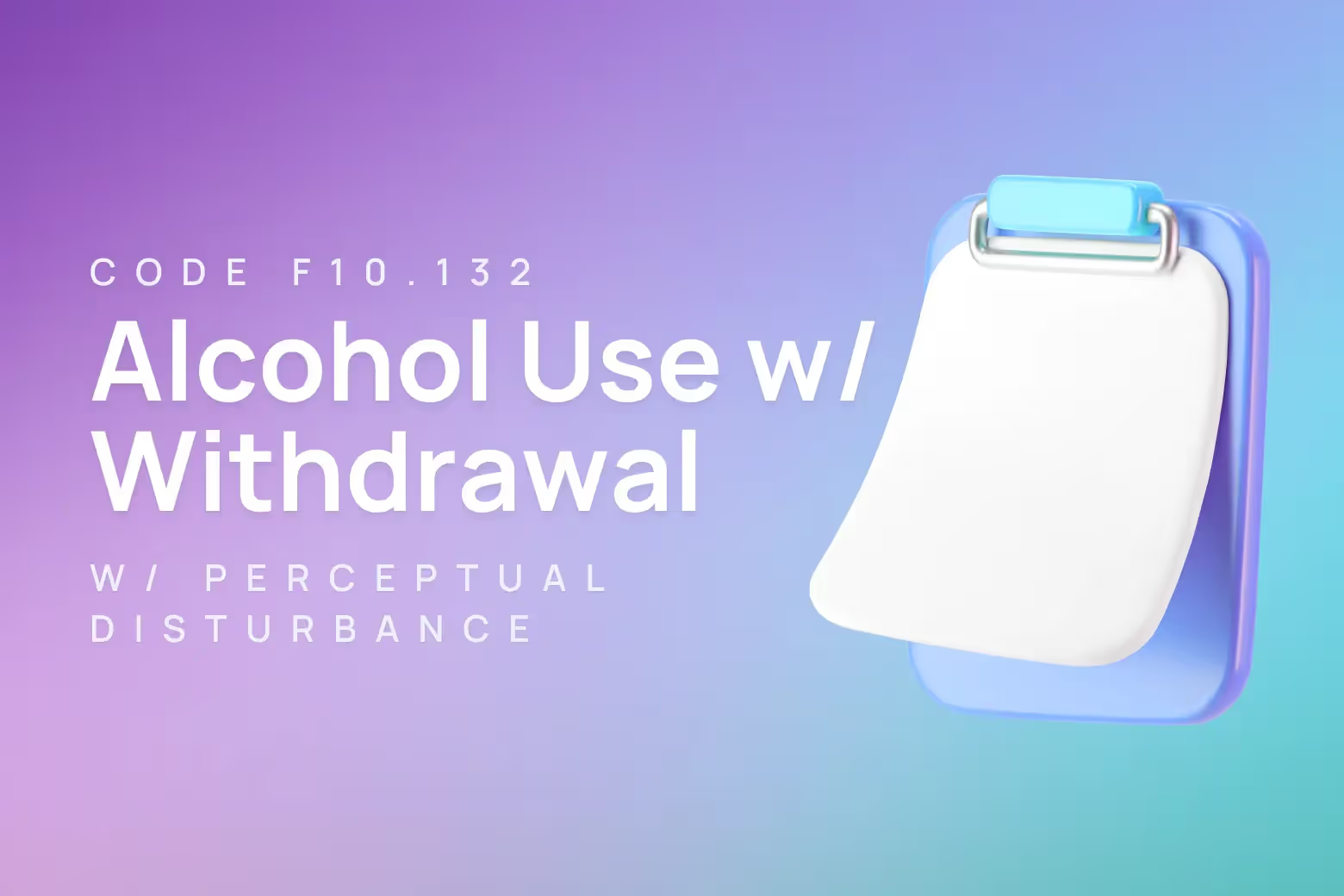ICD-10 code for alcohol abuse with other alcohol-induced disorder

F10.188 is the ICD-10 code for alcohol abuse with other alcohol-induced disorder.
This code captures cases where clients meet criteria for alcohol abuse while simultaneously experiencing additional psychiatric complications directly caused by their alcohol consumption.
Accurate diagnostic coding ensures proper treatment planning and appropriate reimbursement for comprehensive care.
Key features:
- F10.188 ICD-10 code represents alcohol abuse pattern combined with secondary alcohol-induced psychiatric disorders
- Requires evidence of both problematic alcohol use and co-occurring alcohol-caused mental health symptoms
- Includes conditions like alcohol-induced mood, anxiety, or sleep disorders not otherwise specified
- Fourth character "8" indicates presence of other specified alcohol-induced conditions

Diagnostic criteria for alcohol abuse with other alcohol-induced disorder (F10.188)
The F10.188 diagnosis combines two distinct clinical presentations that must both be present:
- The alcohol abuse component requires demonstration of a problematic drinking pattern that significantly impairs functioning or causes distress.
- Clinicians must establish that alcohol consumption directly precipitates the secondary mental health condition.
This temporal relationship distinguishes alcohol-induced disorders from independent psychiatric conditions that happen to co-occur with drinking problems.
The diagnostic process involves documenting:
- Evidence of recurrent alcohol use resulting in failure to fulfill major role obligations at work, school, or home
- Continued alcohol consumption despite persistent social or interpersonal problems caused by drinking effects
- Recurrent alcohol use in physically hazardous situations
- Persistent alcohol consumption despite knowledge of ongoing physical or psychological problems likely caused by alcohol
- Important social, occupational, or recreational activities given up or reduced due to alcohol use
- Alcohol-induced psychiatric symptoms that develop during or shortly after intoxication or withdrawal
- Clear evidence that the mental health symptoms are directly caused by alcohol use rather than pre-existing conditions
When to use F10.188 diagnosis code
Differential diagnosis requires careful assessment to distinguish F10.188 from related alcohol-related conditions.
The presence of alcohol-induced psychiatric symptoms differentiates this code from simpler alcohol abuse presentations.
F10.188 vs F10.10 (Alcohol abuse, uncomplicated)
Use F10.10 when clients demonstrate problematic alcohol use patterns without additional alcohol-induced mental health complications.
F10.188 applies specifically when secondary psychiatric symptoms clearly result from alcohol consumption.
The uncomplicated code captures clients who meet alcohol abuse criteria but lack the additional psychiatric complications that characterize F10.188.
F10.188 vs F10.180 (Alcohol abuse with alcohol-induced anxiety disorder)
F10.180 applies when the alcohol-induced condition specifically involves anxiety symptoms meeting criteria for an anxiety disorder.
F10.188 covers other specified alcohol-induced psychiatric conditions not captured by more specific subcategories.
Consider F10.188 when alcohol-induced symptoms don't fit neatly into established anxiety disorder patterns but still represent significant psychiatric complications.
F10.188 vs F10.20 (Alcohol dependence, uncomplicated)
The key distinction lies in severity and physiological adaptation patterns.
F10.188 represents abuse-level alcohol problems with secondary psychiatric complications, while F10.20 indicates more severe dependence without additional mental health conditions.
Dependence involves tolerance, withdrawal symptoms, and compulsive use patterns that exceed the abuse threshold captured in F10.188.
Related ICD-10 codes
- F10.180 - Alcohol abuse with alcohol-induced anxiety disorder
- F10.181 - Alcohol abuse with alcohol-induced sexual dysfunction
- F10.182 - Alcohol abuse with alcohol-induced sleep disorder
Interventions and CPT codes for alcohol abuse with other alcohol-induced disorder
Evidence-based treatment for F10.188 requires addressing both the underlying alcohol abuse pattern and the secondary psychiatric complications.
Integrated approaches produce superior outcomes compared to treating each condition separately.
Cognitive behavioral therapy
Cognitive behavioral therapy represents the gold standard psychosocial intervention for alcohol abuse conditions.
CBT addresses cognitive distortions, situational triggers, and maladaptive coping strategies that maintain both alcohol use and secondary psychiatric symptoms.
Treatment typically involves 12 weekly individual sessions focusing on identifying high-risk situations, developing effective coping strategies, and modifying alcohol-related expectations and beliefs.
Relevant CPT codes:
- 90791 - Psychiatric diagnostic evaluation for comprehensive intake assessment
- 90834 - Psychotherapy, 45 minutes for standard CBT sessions
- 90837 - Psychotherapy, 60 minutes for intensive CBT work
Motivational interviewing
Motivational interviewing effectively addresses ambivalence about changing drinking patterns while respecting client autonomy.
This approach works particularly well as a precursor to more intensive interventions or for clients with less severe presentations.
The collaborative, non-confrontational style helps clients explore discrepancies between their current alcohol use and personal values or goals.
Relevant CPT codes:
- 99408 - Structured screening and brief intervention, 15-30 minutes
- 99409 - Structured screening and brief intervention, over 30 minutes
- 90832 - Psychotherapy, 30 minutes for brief motivational sessions
Integrated dual diagnosis treatment
Clients with F10.188 benefit from treatment approaches that simultaneously address alcohol abuse and secondary psychiatric symptoms.
This prevents the common pattern where untreated psychiatric symptoms trigger drinking relapse.
Treatment planning considers how alcohol use exacerbates psychiatric symptoms and how psychiatric distress may trigger increased drinking.
Relevant CPT codes:
- 90834 - Psychotherapy, 45 minutes for integrated treatment sessions
- 90847 - Family psychotherapy with patient present when family dynamics contribute to both conditions
- 90853 - Group psychotherapy for dual diagnosis support groups
How Upheal improves F10.188 ICD-10 documentation
Suggesting appropriate ICD-10 codes based on session content
Upheal's clinical documentation platform analyzes therapy session content to identify patterns consistent with alcohol abuse and co-occurring psychiatric symptoms. The platform recognizes key clinical indicators that support F10.188 diagnosis, including descriptions of problematic drinking patterns alongside alcohol-induced mood, anxiety, or sleep disturbances.
This automated analysis helps clinicians capture diagnostic complexity that might otherwise be overlooked during busy clinical days. The platform flags when session content suggests secondary psychiatric complications beyond simple alcohol abuse.
Maintaining HIPAA-compliant records with proper diagnostic coding
Accurate F10.188 coding requires detailed documentation linking alcohol use patterns to specific psychiatric symptoms. Upheal maintains comprehensive, searchable records that support diagnostic justification while ensuring full HIPAA compliance.
The platform helps clinicians document the temporal relationship between alcohol consumption and psychiatric symptom emergence, which is essential for establishing alcohol-induced disorders rather than independent co-occurring conditions.
Reducing administrative burden so you can focus on client care
Complex diagnoses like F10.188 require extensive documentation to support medical necessity and appropriate treatment planning. Upheal automates much of this documentation work, allowing clinicians to spend more time providing direct clinical services.
The platform generates treatment summaries that clearly articulate how both alcohol abuse and secondary psychiatric symptoms impact client functioning, supporting comprehensive care coordination.
Supporting clients with alcohol abuse and another alcohol-induced disorder
Clients presenting with F10.188 often experience significant shame and confusion about the relationship between their drinking and mental health symptoms.
They may not recognize that their psychiatric distress directly results from alcohol consumption rather than representing separate, unrelated conditions.
Effective treatment involves psychoeducation about how alcohol affects brain chemistry and psychological functioning. Clients benefit from understanding that addressing their drinking patterns will likely improve their secondary psychiatric symptoms as well.
The integrated nature of F10.188 requires clinicians skilled in both substance use and mental health treatment approaches.
Collaboration between addiction specialists and mental health professionals often produces optimal outcomes for these complex presentations.
Upheal's clinical documentation platform helps clinicians provide comprehensive care for clients with F10.188 by capturing the nuanced interplay between alcohol use and psychiatric symptoms.
Ready to improve your diagnostic accuracy and clinical documentation? Try Upheal free and experience how technology can support better client outcomes.













